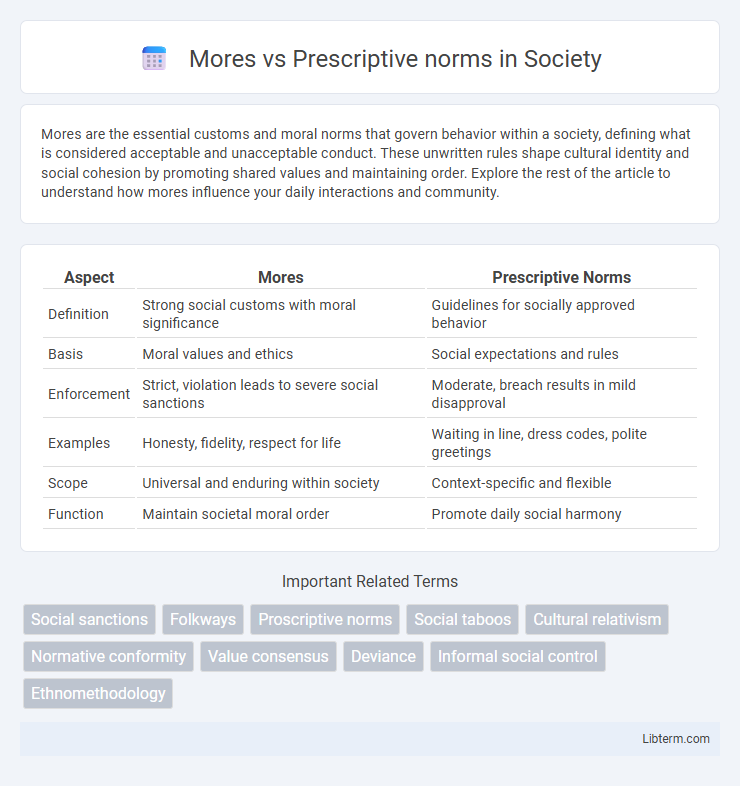Mores are the essential customs and moral norms that govern behavior within a society, defining what is considered acceptable and unacceptable conduct. These unwritten rules shape cultural identity and social cohesion by promoting shared values and maintaining order. Explore the rest of the article to understand how mores influence your daily interactions and community.
Table of Comparison
| Aspect | Mores | Prescriptive Norms |
|---|---|---|
| Definition | Strong social customs with moral significance | Guidelines for socially approved behavior |
| Basis | Moral values and ethics | Social expectations and rules |
| Enforcement | Strict, violation leads to severe social sanctions | Moderate, breach results in mild disapproval |
| Examples | Honesty, fidelity, respect for life | Waiting in line, dress codes, polite greetings |
| Scope | Universal and enduring within society | Context-specific and flexible |
| Function | Maintain societal moral order | Promote daily social harmony |
Understanding Mores: Definition and Characteristics
Mores are deeply ingrained social norms that embody the moral views and ethical standards of a community, often linked to fundamental values and societal expectations. Unlike prescriptive norms, which specifically dictate appropriate behaviors in given situations, mores carry significant moral weight and violations typically provoke strong social disapproval or legal sanctions. Their characteristics include being unwritten yet widely acknowledged rules that govern behavior to maintain social order and cultural cohesion.
What Are Prescriptive Norms? An Overview
Prescriptive norms are social rules that dictate acceptable and expected behaviors within a group, guiding individuals on how to act appropriately in specific situations. These norms emphasize what people should do, promoting conformity and social order by encouraging behaviors deemed desirable or beneficial by the community. Unlike mores, which are deeply rooted moral customs, prescriptive norms can be more flexible and context-dependent, often enforced through social approval or sanctions.
Historical Origins of Mores and Prescriptive Norms
Mores historically originated from the deeply rooted communal values in ancient societies, serving as unwritten rules essential for social cohesion and moral conduct. Prescriptive norms evolved from formalized guidelines and legal codes designed to regulate behavior more explicitly within developing civilizations. Both types of norms reflect the foundational cultural principles that shaped societal expectations and governance throughout history.
Key Differences Between Mores and Prescriptive Norms
Mores are deeply ingrained moral norms that govern ethical behavior and social conduct, often upheld by strong societal sanctions, whereas prescriptive norms specifically dictate expected behaviors in particular contexts without necessarily involving moral judgment. Mores address fundamental values and are critical for social cohesion, while prescriptive norms function as guidelines or rules to manage everyday interactions. The key difference lies in the moral weight and enforcement severity, with mores carrying more significant consequences for violation than prescriptive norms.
The Role of Mores in Shaping Societal Values
Mores serve as fundamental principles that shape societal values by reinforcing widely accepted moral standards and guiding behaviors essential for social cohesion. These unwritten norms carry strong cultural significance, often linked to issues of right and wrong, and play a critical role in maintaining order within communities. Unlike prescriptive norms, which provide specific behavioral guidelines, mores reflect deep-rooted ethical beliefs that influence the collective conscience of society.
How Prescriptive Norms Guide Everyday Behavior
Prescriptive norms serve as unwritten rules that dictate appropriate behavior in daily interactions, shaping actions through social expectations and moral directives. Unlike mores, which often carry strong cultural or ethical significance, prescriptive norms provide clear guidelines for routine conduct, such as queuing etiquette or communication protocols. These norms influence behavior by promoting social harmony and predictability in various contexts, from workplace settings to public spaces.
Examples of Mores in Various Cultures
Mores are deeply ingrained cultural norms that govern ethical behavior and social expectations, such as the prohibition of incest in many societies and the strict adherence to honesty in Japanese culture. In Middle Eastern cultures, modest dress codes exemplify mores that reflect religious and social values, while in Western societies, mores often include respect for individual rights and prohibitions against theft. These examples illustrate how mores vary widely across cultures but consistently enforce fundamental social morals crucial for community cohesion.
Common Prescriptive Norms in Modern Society
Common prescriptive norms in modern society emphasize behaviors such as honesty, punctuality, and respect for others, which guide social interactions and maintain order. These established rules dictate acceptable conduct and often carry moral weight, differentiating them from mores that are more deeply rooted in cultural or religious beliefs. Observing prescriptive norms fosters social cohesion and helps individuals navigate daily life within diverse communities.
Consequences of Violating Mores vs Prescriptive Norms
Violating mores typically results in severe social sanctions such as ostracism, legal penalties, or moral condemnation due to their strong cultural significance and association with fundamental values. Prescriptive norms, while important for maintaining order, usually lead to milder consequences like social disapproval or corrective feedback when breached, reflecting their role in guiding acceptable behavior. The differential impact highlights how mores are deeply embedded in a society's ethical framework, whereas prescriptive norms function more as conventional rules.
The Importance of Mores and Prescriptive Norms in Social Order
Mores represent deeply ingrained moral customs essential for maintaining societal cohesion by guiding behavior aligned with core values. Prescriptive norms establish explicit rules that regulate actions, ensuring predictability and stability within social interactions. Together, mores and prescriptive norms form the foundational framework that upholds social order and fosters collective harmony.
Mores Infographic

 libterm.com
libterm.com